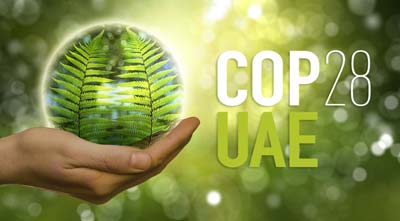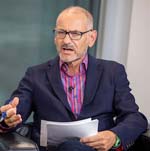Dr Roger Harrabin – formerly BBC Environment Analyst – is at COP28 in Dubai, moderating events for We Mean Business Coalition and others – and writing for BusinessGreen and The Independent. He offers his thoughts for JLA.
 As the mammoth climate COP in Dubai stumbles towards the half-way mark, delegates are debating whether it’ll be a success or a failure. The answer is… it depends how you measure it.
As the mammoth climate COP in Dubai stumbles towards the half-way mark, delegates are debating whether it’ll be a success or a failure. The answer is… it depends how you measure it.
It will fail in the sense that if the climate could speak it would scream that after all the well-meaning hot air in Dubai, the pollution overheating the planet will still be rising – and that’s decades after CO2, methane and other gases were identified as an unprecedented threat to human society.
It would cry that the catalogue of appalling extreme weather events this year has proved to all but the most determined of deniers that dangerous climate change is already happening around us in the shape of fires, floods and melting ice. Scientists are aghast at the welter of weather records appearing right at the top end of projected range. Sea temperatures actually rose beyond any projections from science. So this conference can’t solve the climate problem: it can only make things less bad.
On the other (smaller) hand, COP 28 is looking like a qualified success on a number of fronts. Firstly, COP President Sultan Al Jaber pulled a rabbit out of the hat by announcing the new Loss and Damage Fund to compensate developing countries for weather disasters made worse by greenhouse gases pumped out by rich nations.
For COP veterans like myself this was an emotional breakthrough. Over years of attending these annual talks a camaraderie develops between delegates from the media and NGOs who tend to have a shared interest in ensuring a liveable planet.
One admired and much-liked delegate, Saleemul Huq from Bangladesh, has been pressing for years for a fund to compensate countries harmed by other people’s pollution, but has been denied by rich nations – especially the USA, which feared that it might lead to stronger demands for very expensive legal redress.
Mr Al Jaber delighted delegates by announcing just such a fund – a couple of weeks after Saleemul died. It gives an insight into the workings of the behemoth of COP which brings together around 90,000 people from business, civil society, science and policy to seek solutions to this vast problem we have caused.
Mr Al Jaber immediately threw $30bn into the pot – climate damages stretch to trillions…. The World Bank, which will host the fund temporarily until a full-time organisation is formed, was reputedly promising that cash would be available for disaster-hit nations within as little as three months.
That’s easier said than done, of course. I have just moderated a breakfast session on climate and health care for #WeMeanBusiness Coalition featuring Lauren McKown, Managing Director at Seed Global Health, a medical charity that trains doctors and nurses in developing countries. She warned that some of the nations most affected by climate disasters didn’t have the institutional capacity to fill in the forms to obtain financial help.
Back to Mr Al Jaber, though, and it seems he is likely to also likely to secure an agreement to treble the use of renewable energy by 2030. This is big – not just for those who enjoy wind or solar power for the first time, but also for future investors who will see the cost of solar panels falling vertiginously as production scales up. This would be an easy hit, because many countries are striving for energy security through renewables anyway. Ditto; a pledge to double energy efficiency, known by experts as the “invisible” fuel because every kilowatt of energy saved is a kilowatt’s less energy that needs to be generated. (Renewables are not actually free, by the way, because of the emissions created in making the wind turbines or solar panels).
There’s been a breakthrough, too, on agriculture. The food system produces something between 20-30% of global emissions through methane and CO2, but so far it has escaped inclusion in the mandatory inventories of greenhouse gases that country must compile. Lobbyists from Big Food are reported to be here in force trying to hold the status quo, but it seems there will be a formal mandate to “assess” the impact of agriculture on the climate crisis. This, for Big Food, is the thin end of the cheese.
There’s encouraging words, too, about methane reductions from oil and gas escaping from drilling and refining. And there’s been a health day for the first time, drawing the links between climate change and a myriad of health issues such as heat deaths, floods, disruption to food, sanitation and water, insect-born diseases – and mental health of people suffering climate anxiety.
Lastly, but by no means least, will come some sort of declaration that implies a diminishing future for fossil fuels. In diplomatic terms this is a real breakthrough. But it won’t, sadly, be remotely enough to return us to a stable climate.

Dr Roger Harrabin
Roger is a leading environmental voice who has served as the BBC’s Energy and Environment Analyst for over 30 years. A global pioneer in environmental reporting, he founded and presented the award-winning BBC program “Costing the Earth.”
View Dr Roger Harrabin’s full JLA profile here.